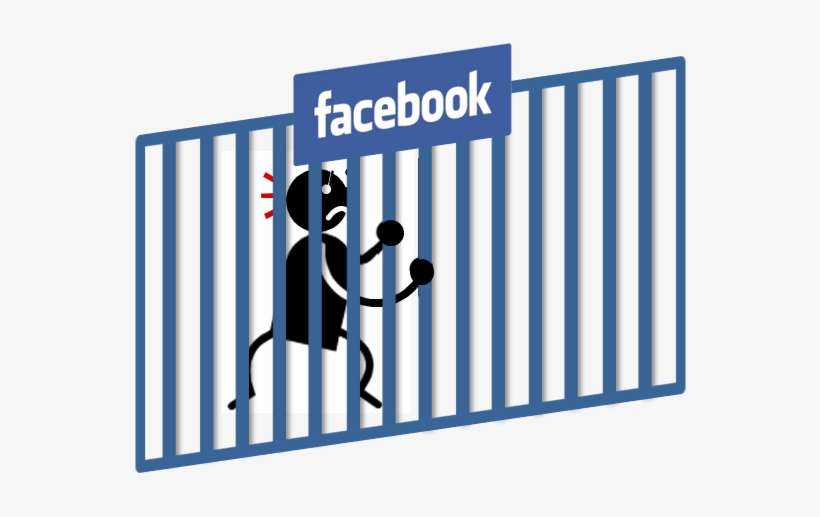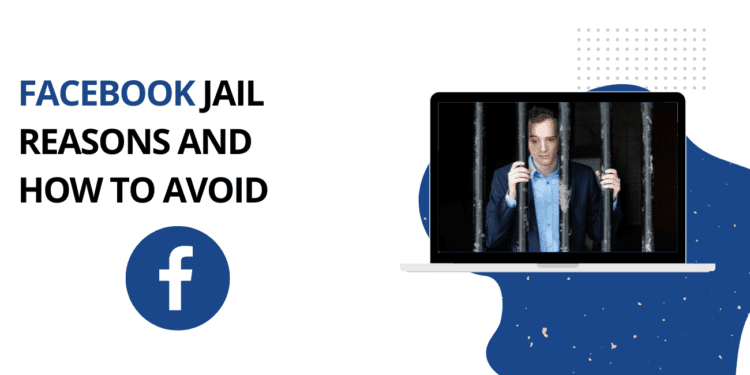Facebook jail is a term used by Facebook marketers who have been temporarily suspended from Facebook. Learn what it means, why you get banned and how to avoid it.
Introduction:
It’s no secret that Facebook can be a breeding ground for drama. From flame wars to cyberbullying, the social media site has been known to cause more than its fair share of online squabbles. And now, there’s a new term for getting into trouble on Facebook: “Facebook Jail.”
Facebook Jail is a term used to describe the negative consequences that can occur when someone posts something on Facebook that they later regret.
For example, if someone posts something inflammatory or offensive and then gets into trouble with their boss or professor, they might be said to be in Facebook Jail.
This term is also used to describe the consequences that can occur when someone posts something that is illegal, such as a nude photo. In this case, the person might be arrested or have to face legal consequences.
Facebook Jail is triggered primarily by violating community standards or having your account disabled for repeated violations of the Terms of Service.
There are also other circumstances that can lead to being in this status, such as an account being hacked, or if you’re trying to recover a disabled account from another person.
This page outlines some ways to avoid getting into this status in the future and how others manage it when they are sentenced to Facebook Jail.
Deep Dive into TOP 10 Best Web Hosting Services of 2022
How do you get Facebook Jail?

Here are Some Reasons:
- Posting something that contains nudity or violence
- Posting duplicate content
- Posting misleading links or ads that are not clearly labeled as advertisements
- Creating an account to harass someone or post spam
- Trying to trick people into giving you money, goods, or services with promises of large profits
- Shortened links can Also cause Facebook jail
- Automatic or Fake Software’s
By Posting something that contains nudity or violence:

When someone’s friends find something they posted that breaks the rules and report them to Facebook, they get a message from Facebook stating that someone has been reported for posting content in violation of their community standards.
The person is then placed in “Facebook jail” until they delete the content that violated the community standards. Facebook jail is similar to a Facebook ban, but it lasts only 24 hours, whereas a Facebook ban lasts seven days.
The Facebook jail lasts for 24 hours. The duration is shown in the notifications area (3rd person view).
If you go too close to a flag and it’s within the 24-hour threshold, you’ll be jailed. When your time is up, you will get a notification saying that your period of imprisonment has ended.
Posting duplicate content:

Duplicate content is when you have the same or almost the same content on one website as you do on another.
Facebook considers this to be spam and will penalize your account.
You may be wondering what would happen if you have a duplicate post that was posted by mistake. Well, this is where Facebook jail comes in.
Facebook jail is the term that people use when they are not able to access their Facebook account because they shared too much duplicate content on their page or had a fraudulent account set up.
When you access your profile after getting out of Facebook jail, it will look different with a temporary name for example “John Doe: (temporary)”.
Facebook has deleted more than 5500 accounts over the past few months. One of the reasons for deleting these accounts is posting misleading links or ads that are not clearly labeled as advertisements.
Posting misleading links.
The more likes and shares a post gets, the higher it will rank on your news feed and the pages you follow. Facebook jail is when a business posts duplicate content on Facebook that is penalized by facebook’s ranking algorithms.
The causes of Facebook jail can be various. It could be because one has posted spammy links or misleading links that are not clearly labeled as advertisements. Clicking on the link will take the user to an advertisement page where they are then asked to sign up for a service or buy something in order to continue browsing further.
This can also happen if one has posted duplicate content on Facebook. Duplicate content is when one shares posts that have already been made, usually with no new changes or additions besides just sharing it again so that it reaches more people and gets more engagement (likes, comments, shares).
This violates Facebook’s terms of use and is against its policies. If you’re caught violating Facebook’s terms, you may receive a warning that states: “Pages with duplicate posts are not allowed to post for seven days unless it has been three months since the last duplicate post.”
Creating an account to harass someone or post spam:

All people want to protect themselves from harassment and spam. For Facebook, the best way to do that is to create a fake account for people who don’t have one and start harassing them.
Creating an account to harass someone or even post spam can get you into “Facebook jail.” Facebook jail is a disconnection from posting on the site for a few days. The site punishes people who try to make Facebook their own personal advertising board by sending members of the “fake profile brigade” away for 3-5 days.
Trying to trick people
Many people are trying to trick people on Facebook with promises of large profits. With the best of intentions, they use the platform to sell products, promote services and make money. But this won’t work if you’re not following Facebook’s Terms of Service. The company doesn’t want people to use it to try and scam others into giving you money, goods, or services.
If you are caught doing so, there’s a chance you’ll end up getting kicked out of Facebook for periods from a few hours to a few days! This can be really frustrating because then you have no way of communicating with friends or family members for that length of time and you may miss out on important events.
If you are going to share content that is not your own, it’s really important to use a secondary source like a news article so that the information is accurate and you don’t get in trouble for sharing something inaccurate.
Shortened links can Also cause Facebook jail:
Websites have been using shortened links where the URL is not shown to increase the number of clicks. However, Facebook has recently made some changes to their platform which now means that those shortened links can cause a user’s account to be “Facebook jail”.
The change was made so that users cannot accidentally share content if they are unaware of what it is. It also means that there is less chance for content being spread without the original creator’s consent.
Unnecessary Tagging:
Tagging people in photos or posts when they haven’t been involved in the conversation or when it isn’t relevant to them is a surefire way of getting yourself put in Facebook Jail. Not only is it annoying for the people you tag, but it’s also a violation of Facebook’s Community Standards. It is against the rules to tag people in photos or posts when they haven’t been involved in the conversation or when it isn’t relevant to them.
Another big no-no is tagging people in photos that are not yours. If you don’t have permission from the owner of the photo to tag someone, don’t do it. This is a violation of Facebook’s Community Standards and could get you into some serious trouble. Unnecessary tagging can also lead to real-world consequences, such as getting fired from your job or into legal trouble.
Abusive Language:
One of the fastest ways to get into Facebook Jail is by using abusive language. This includes cursing, name-calling, and making threats. Even if you’re just joking around with your friends, using abusive language is a surefire way to get yourself into hot water with Facebook.
If you’re found to be using abusive language, you could be temporarily banned from posting on Facebook. In severe cases, you could be permanently banned from the site. So, it’s best just to avoid using abusive language altogether. When someone does use abusive language towards you, just report it to Facebook, and they will deal with the person accordingly.
Sending Too Many Requests:
Sending requests is quite beneficial to add new friends and people you love, but sometimes it gets you in trouble if it is done excessively. It happens when a user sends lots of friend requests in a day or two, which looks like spamming from Facebook’s perspective. In such a scenario, Facebook takes strict action, and that is termed Facebook Jail.
This often happens with new users who are not aware of the rules and conditions of Facebook. So, if you are a new user, make sure that you don’t send more than 100 friend requests in a day. If you want to add more friends, then take some time and space it out over a few days. No specific number of requests can get you into Facebook Jail, but as per the general rule, don’t send more than 100 requests in a day.
Non-accurate Profile:
Your Facebook profile is like your public display of art. You should always be proud to show it off because the more people see what’s inside, the better. A non-accurate or uncompleted social media account can lead you down a slippery slope that will make prison bars look amateurish in comparison.
A non-accurate or uncompleted Facebook profile is one of the major reasons for getting into Facebook jail. Your profile should have your real name, profile picture, gender, and other information. If any of this information is missing or not accurate, you may get into Facebook jail.
Your social media accounts can have a significant impact on your business. Ensure the information you provide is accurate and up-to-date so potential customers don’t get frustrated with an incomplete profile or page.
Improper Use Of Features:
Some features on Facebook can only be used for specific purposes. If you use these features for something other than their intended purpose, you may end up in Facebook jail. For example, you can only use the tagging feature to tag people in photos or videos. You cannot use it to tag people in status updates or comments. If you do, you may be penalized with a Facebook jail sentence.
Another example is the events feature. This feature is only to be used for creating and promoting events. It should not be used for spamming purposes or to promote non-events. You may end up in Facebook jail if you use it for either of these things. There are other plenty of other examples, so be sure to familiarize yourself with the proper use of Facebook’s features before using them.
Spamming:
Spamming is a major no-no on Facebook (and everywhere else, for that matter). If you spam people on Facebook, you may end up in Facebook jail. Spamming includes:
- Posting the same message over and over again.
- Posting comments on people’s posts that are unrelated to the post.
- Sending people messages that are not relevant to them.
Basically, if you’re posting anything that is irrelevant or unwanted, you’re spamming. And if you spam people on Facebook, you may end up in Facebook jail. So be sure only to post relevant and useful information on Facebook and send people messages they would actually want to receive.
Impersonating Someone:
Impersonating someone else on Facebook can lead to serious consequences. According to Slate magazine, impersonating a public figure, like the President of The United States or another well-known personality, could get you into trouble with law enforcement.
This includes creating a profile for a fictitious person or creating a profile that is intended to be used for spamming or other malicious purposes. This also includes using someone else’s identity to create a profile, which is known as “catfishing.” If you impersonate someone on Facebook, you may end up in Facebook jail.
Hacking Into Someone’s Account:
Hacking into someone’s Facebook account is a serious offense. You may end up in Facebook jail if caught doing this. Hacking includes accessing someone’s account without their permission, stealing their login information, or guessing their password.
It also includes using a third-party application to access someone’s account without their permission. You may be penalized with a Facebook jail sentence if you do any of these things. So be sure to only access Facebook accounts that you have been given explicit permission to access.
Automatic or Fake Software:
Automated software falsely enters likes, shares, and other actions on behalf of users. These bots are constantly running and some use deceptive online identities to spam the site with thousands or millions of messages at a time.
How long is Facebook jail?

Being placed in a Facebook jail can be caused by many things. The most common reason is the use of profanity or intimate content on your timeline or photos that violate those standards. In addition, posting explicit or violent content on your profile could also land you in jail for a short period of time.
Facebook considers any type of nudity and profanity to be inappropriate for their platform and will suspend an account for it if they catch it within 3 days from when it was posted.
It usually lasts 30 days, during which users are not able to log in. Once the user has ‘served their time,’ their account will be automatically un-suspended and they can log back in.
Ways of avoiding Facebook Jail?

Many people don’t know what they’re doing wrong and end up getting their accounts suspended. Here are some tips on how to avoid Facebook Jail:
- Don’t post nudity, violence, or hate speech.
- Don’t spam or post links to scam sites.
- Don’t harass or bully other users.
- Don’t post copyrighted content without permission.
- Don’t post fake news stories.
- Report any posts that violate Facebook’s Community Standards.
- Don’t use your personal Facebook page to promote your business or website.
- Don’t use your personal Facebook page to promote any commercial activity.
- Don’t change the privacy settings of other people’s accounts without their permission.
- Don’t send or post spam, viruses, or malicious links.
- Facebook is a large site, so if you find a post that violates one of the above rules, please report it.
How Does Facebook Jail Work?
It’s not really Facebook Jail, and it’s more like Facebook Jail for Businesses. It’s a place where businesses can go to get their Facebook page taken down because they have violated one of the terms of service. One common violation is using fake profiles to Like or Follow a business’s page.
This is against Facebook’s rules because it artificially inflates the number of Likes or Followers a page has, which can give the impression that the business is more popular than it is. Another common violation is posting spam or ads on someone else’s timeline without their permission. This can be annoying and frustrating for users, so Facebook has clarified that it won’t tolerate this behavior.
If you’re a business owner, it’s important to familiarize yourself with Facebook’s terms of service so that you don’t accidentally violate them and end up in Facebook Jail. Not only will your page be taken down, but you could also be banned from using Facebook altogether. So it’s definitely not something you want to mess around with.
If you think your business’s Facebook page has been unfairly taken down, you can appeal the decision by following the instructions on this page. Facebook Jail is real, but it’s nothing to be afraid of as long as you’re familiar with the rules and you make sure to follow them. Just play by the rules, and you’ll be fine.
Why is Its Called Facebook Jail?
When you hear the term “Facebook jail,” it might conjure up images of a dark, dank place where your account is locked away for some unknown period of time. But that’s not really what Facebook jail is. There is no such thing as an official Facebook Jail. It’s not a place where you’re actually locked up and unable to use Facebook. The term is a colloquialism that refers to being banned or restricted from using Facebook.
This can happen if you violate one of Facebook’s terms of service. For example, if you create a fake profile to Like or Follow a business’s page, you could be banned from using Facebook. So while there is no such thing as an official Facebook Jail, it’s still important to familiarize yourself with the rules and make sure you don’t violate them. Otherwise, you could find yourself banned or restricted from using Facebook.
How to Appeal Facebook Jail?
To appeal Facebook jail, you need to follow these steps:
- Like 10 posts made by people who you don’t follow
- Make 5 posts in one day on different days of the week
- Unfollow people you don’t know
- Don’t use too many hashtags and “like”/comment on too many posts
Some tips on how to get out of Facebook Jail:
It is important to comply with Facebook’s Community Standards and be mindful of the terms. Specifics can be found here: https://www.facebook.com/communitystandards/
Some tips on how to get out of Facebook Jail:
- You can get out of jail by deleting the original post or video, providing an update, and notifying your friends that you no longer have access to your account.
- You can also appeal for a review through the Online Appeals form and provide any additional information about why you think your content was removed in error.
- If you still remain blocked by Facebook, then you will need to follow the instructions on how to report a fake account or page in order for them to investigate if it was mistakenly mistaken as violating their Community Standards or not.
How to Protect Your Account from Facebook Jail?
There are many ways to protect your account from being disabled. One of them is keeping your posts relevant and transparent. You should also stop using bots that auto-share your posts, which can be a violation of Facebook’s rules.
What are some tips for staying safe on Facebook?
When it comes to safety on Facebook, there are a few key things to keep in mind. First and foremost, don’t share any personal information with people you don’t know. This includes your address, phone number, and email address.
Additionally, be careful about what you share on your profile. Don’t post anything that could potentially identify you or make you vulnerable to identity theft. Finally, be aware of the scams that are commonly used on Facebook.
Be skeptical of any offers or requests that seem too good to be true, and never give out your personal information or payment information in response to a request from someone you don’t know. If you follow these tips, you’ll stay safe while using Facebook.
FAQs
What is meant by Facebook Jail?
Facebook Jail is a term used to describe when someone’s Facebook account has been temporarily suspended. This can happen for a variety of reasons, such as violating Facebook’s terms of service, spamming, or creating fake profiles.
Does Facebook jail deactivate your account?
Yes, Facebook can and will deactivate your account if they believe you have violated their terms of service.
Does Facebook jail affect messenger?
Yes, Facebook jail can affect messenger. If your account is temporarily suspended for violating Facebook’s Community Standards, you may not be able to use Messenger.
Does Facebook jail affect Instagram?
Yes, Facebook jail can affect your Instagram account. If you are repeatedly posting content that violates Facebook’s Community Standards, you may be temporarily blocked from posting on Facebook. This could also prevent you from posting on Instagram. (In case you connect the Facebook logins with Instagram).
What happens when you are in Facebook Jail?
Facebook jail is a term used to describe a situation in which a user’s access to Facebook is restricted. This can happen for a number of reasons, including violating Facebook’s terms of service or engaging in suspicious activity. When a user is in Facebook jail, they may be unable to post on Facebook, send messages, or even access their account. In some cases, a user may be able to appeal their case to Facebook and have their account reinstated. However, in other cases, a user may be permanently banned from the site.
Final Verdicts
In conclusion, it’s important to be aware of the consequences of Facebook jail avoidance and to take steps to prevent it. For individuals and businesses, that means being respectful of Facebook’s community guidelines and using common sense when posting.
For social media managers, it means being proactive in monitoring posts and ensuring that content is compliant with Facebook’s standards. By taking these precautions, we can all help keep Facebook a safe and enjoyable space for everyone.








